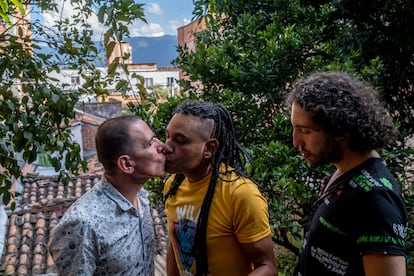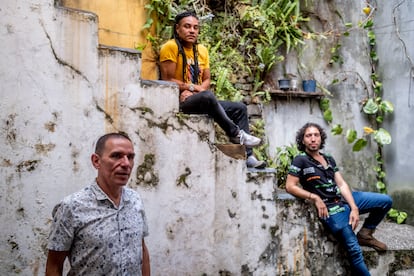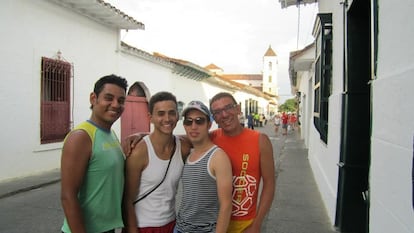A polyamorous family shakes up Colombia’s laws
The nation’s highest court ruled in favor of three men who lived together for 10 years and the two who claimed survivor beneficiary rights when one died


Manuel Bermúdez is part of a polyamorous family of three men who sleep in a bed so wide it almost doesn’t fit in the bedroom. He has also been involved in a number of firsts for Colombia. He and his partner, Alejandro Rodríguez, became the first legally recognized same-sex marriage in 2000. In 2017, they added a third person to their union. In another first for Colombia, their tripartite matrimony was recently legally recognized by the nation’s highest court in a decision that affirms the pension beneficiary rights of the surviving spouses and revolutionizes the country’s laws.
“I am an atypical gay man – all of us are atypical gay men,” he says with a laugh while making coffee at home in Medellín’s (northwestern Colombia) Robledo neighborhood. But instead of “gay,” he uses the word “loca,” a pejorative term for homosexuals in one of the country’s most conservative cities. Their house is built in the region’s traditional architectural style. There’s a tall Christmas tree with lights and ornaments, and a backyard with mango trees. But this home is anything but traditional because it has three husbands – and for a time, there were four.
The story of this marriage of three begins in 1999 when the word polyamory was not fashionable. At first, it wasn’t much more than two men who liked each other and wanted to have sex. Manuel met Alejandro one night and they began a casual dating relationship. They soon fell in love, and a year later were married by a notary public in a symbolic wedding that did not confer any legal rights to the spouses. Despite the opposition of the Catholic Church and other notaries, they proclaimed their love in the glare of a harsh media spotlight.
It was a symbolic and political act – a provocation intended to shake up the city and ignite a battle for same-sex marriage that was just getting started in Colombia. Seven years later, when the Supreme Court extended de facto civil union rights to same-sex couples, Manuel and Alejandro married once again. This time, their union was legally recognized and had all the rights of any marriage.

As happens to many couples, one of them met someone else. Alejandro fell in love with Esnéider Zabala, a young man who sang in the university choir where Alejandro was studying. When he told Manuel about it, instead of separating, Alejandro and Manuel added Esnéider to the relationship. “I asked myself, ‘Why shouldn’t my husband have a boyfriend?’ It seems very unreasonable to separate abruptly when it takes so long to win each other over fall in love,” said Manuel. That was a crucial revelation for Manuel, who did not like Esnéider at first. But the two ended up falling deeply in love. “I don’t know how this will turn out,” he said at the time, “but let’s see what life is like for the three of us.”
They were three professionals making a home together – a trio, not a threesome, because it went beyond sex. They presented themselves as a family of three because that’s what they were. “The three of us do have sex, of course, but this family is based on love. I remember the afternoon when we introduced Esnéider to my nephews. We were watching television, and one of them asked, ‘Another boyfriend, Uncle?’ I casually said yes, and they just accepted it and began calling him uncle,” said Bermúdez.
For 10 years, the trio were in a stable relationship, with all the ups and downs that every family experiences. They didn’t start proselytizing about polyamory. “People are sometimes disappointed,” said Bermúdez. “You have to be smart about polyamory because it’s not about jumping into a relationship. It’s about falling in love with each other. Falling in love with one person – fine. But falling in love with two is complicated, and three is very difficult. Some people who have tried to join the family just haven’t been able to deal with this,” said Alejandro Rodríguez, a professional dancer. Rodríguez is the one looking out for those who want to divide their relationship.
Eventually, they decided to add another partner. Victor Prada, a theater actor and psychoanalysis student, became “the fourth,” and says, “That’s how they introduced me. The first night I was in bed with three men, I was so emotional that I couldn’t sleep.” After a period of dating the trio, Prada joined the family and began living with them. He says he always dreamed about having a stable family and he found one there.
A death tests the relationship
A death in this untraditional family soon shook its foundations. In 2014, Esnéider was diagnosed with stomach cancer and learned that he only had three months to live. Each husband took his own approach to coping with the pain. Alejandro devoted himself to caring for the sick man. Victor became the strong one, and Manuel breathed strength into Esnéider. “I told him, ‘If you’re going to die in three months, my dear, we’re going to have a good time. You’re going to do whatever you want,’” said Manuel. Nevertheless, they all admit that it was devastating.
A few months after Esnéider died, Manuel and Alejandro applied to receive survivor benefits from Esnéider’s pension. The private pension fund rejected their claim on the grounds that it did not recognize polyamorous unions, and said Esnéider’s mother had already requested the pension.

But since their relationship was public, Bermúdez and Rodríguez were able to prove to a judge that they fulfilled the five-year cohabitation requirement. Four years after Esnéider’s death, a local court in Medellín ruled in favor of the two because the mother did not live with Esnéider, and ordered the pension fund to begin disbursing funds to Bermúdez and Rodríguez with retroactive effect. It was a surprising ruling for an often conservative judiciary that said its decision was based on the importance of autonomy. “Several people, regardless of gender, can come together in the spirit of building a family. One person can love two others at the same time, and three can love each other as well,” wrote the magistrates.
But the legal process did not end there. The pension fund filed an appeal, and the case went to Colombia’s Supreme Court. While the wheels of justice slowly turned, Alejandro, Manuel and Victor recorded another first – they became the first trio to become legally married in Colombia. The marriage certificate states, “… the constitution of a tripartite patrimonial regimen,” and used a new legal term – trieja – a “throuple.” And so, the three men formalized polyamory in Colombia.
The Supreme Court’s ruling
The Supreme Court’s ruling in favor of the three spouses determined that this polyamorous family should be protected and have their pension rights recognized. Justice Santander Rafael Brito says that the ruling recognizes that people can choose their own family paradigm. “The pension fund was trying to impose a definition of a family that was against equality and discriminatory.” Until now, Colombian law allowed survivor benefits to be split between the deceased’s spouse and his or her permanent partner. In other words, between the widow or widower and their lover, who had to live in separate houses. But it did not allow granting benefits to members of stable, polyamorous relationships who lived together.
The news of the Supreme Court’s decision was received with surprise and joy by Manuel, Alejandro and Victor. “For us, it’s not about the money. It’s about defending our family,” said Manuel, who will split the benefits from Esnéider’s pension with Alejandro. Victor is not named as a beneficiary because he had only been in the relationship for a year and a half when Esnéider died. “I never claimed anything because I wasn’t legally covered. But I also lost a loved one, and I’m a widower too,” he said.

In a statement to the Supreme Court’s media relations department, the presiding magistrate in the case said, “The number of permanent partners is irrelevant. In this case there were three, but there can be more, all with the same proportional rights. The legal issue to resolve was whether, for the purpose of distributing survivor pension benefits, simultaneous cohabitation with a permanent partner should be understood as the simultaneity of multiple households, and does not contemplate a single household with multiple members.”
The decision could make life easier for spouses in a polyamorous relationship. “This opens up new possibilities in marriages of three people and for polyamory. This magistrate will go down in history as someone who dared introduce a new word in the legal canon,” said Manuel. There is already talk around Medellín of another group of polyamorous people who want to get married.
But from a more personal perspective, the three men see the ruling as a vindication of their love for Esnéider. “It means that they recognize us as a family, that they understand that our home is not only stable, but also visible and legal,” said Victor. It’s also an affirmation of other free spirits who want to establish their own types of families. “We want to be an example of how love can be found in a family – any kind of family,” said Manuel.
Sign up for our weekly newsletter to get more English-language news coverage from EL PAÍS USA Edition
Tu suscripción se está usando en otro dispositivo
¿Quieres añadir otro usuario a tu suscripción?
Si continúas leyendo en este dispositivo, no se podrá leer en el otro.
FlechaTu suscripción se está usando en otro dispositivo y solo puedes acceder a EL PAÍS desde un dispositivo a la vez.
Si quieres compartir tu cuenta, cambia tu suscripción a la modalidad Premium, así podrás añadir otro usuario. Cada uno accederá con su propia cuenta de email, lo que os permitirá personalizar vuestra experiencia en EL PAÍS.
¿Tienes una suscripción de empresa? Accede aquí para contratar más cuentas.
En el caso de no saber quién está usando tu cuenta, te recomendamos cambiar tu contraseña aquí.
Si decides continuar compartiendo tu cuenta, este mensaje se mostrará en tu dispositivo y en el de la otra persona que está usando tu cuenta de forma indefinida, afectando a tu experiencia de lectura. Puedes consultar aquí los términos y condiciones de la suscripción digital.








































